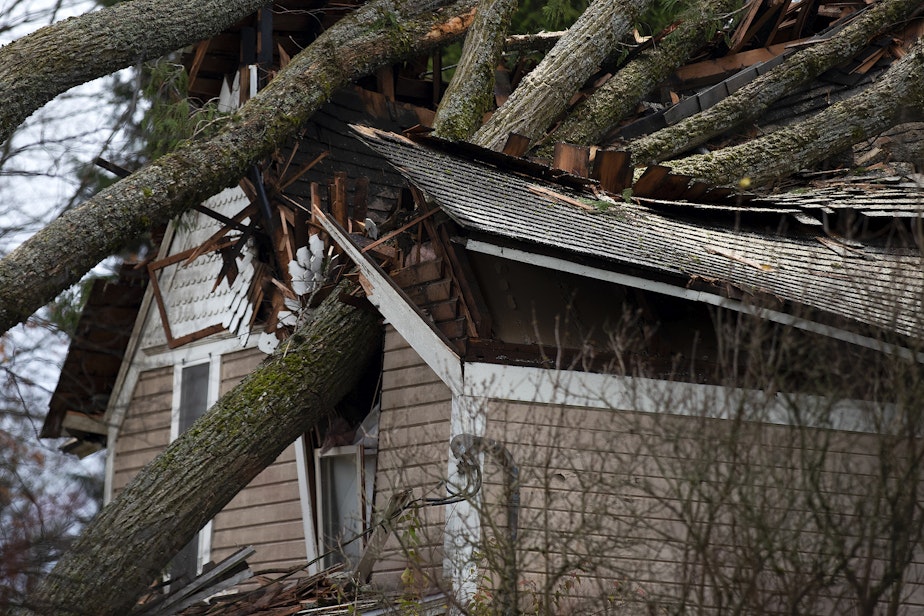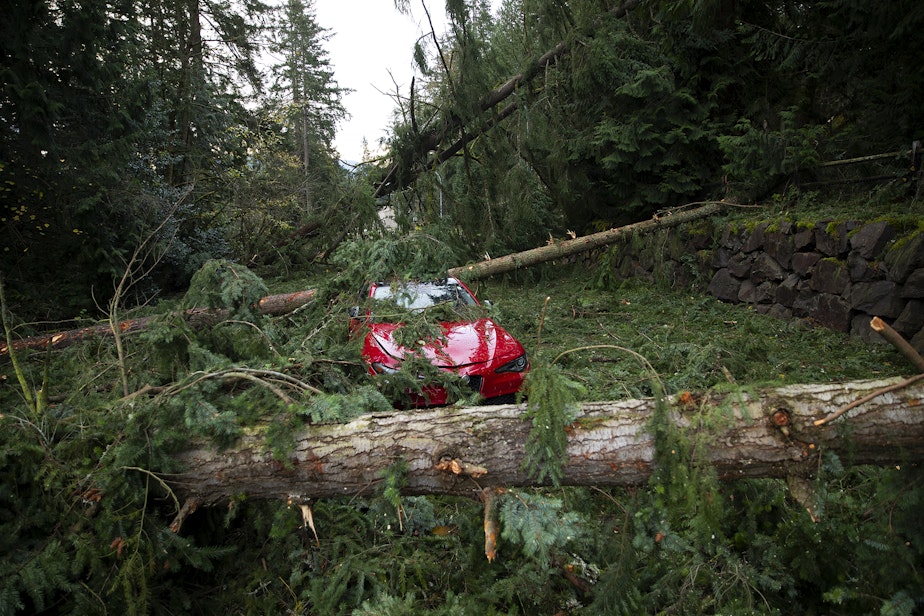States denied disaster aid as FEMA safety net begins to shrink

In his first 100 days, President Donald Trump turned down half the requests for major disaster aid that crossed his desk.
Previous presidents had approved the vast majority of governors’ pleas for help after disasters struck, a KUOW investigation has learned.
Washington state’s request to declare a November bomb-cyclone windstorm a “major disaster” was the first Trump denial to make headlines.
State officials and the Federal Emergency Management Agency estimated the windstorm had caused $34 million in damage, or $4.42 for every person in Washington state. That joint assessment put costs at more than twice the $1.89 per-capita threshold the agency usually uses in deciding whether a catastrophe is severe enough to warrant federal intervention.
FEMA notified Washington state officials on April 11 that their request for a major disaster declaration, which would have opened up the spigot for federal dollars, had been denied, without explaining why.
When major disasters are declared, FEMA typically covers 75% of the cost of removing debris and replacing public infrastructure like roads and power lines. It also provides grants to individuals to repair and rebuild.
“No one can recall a time that we have met the indicators and been denied public assistance,” said spokesperson Karina Shagren with the Washington Military Department, which includes the state’s emergency management division.
Sponsored
RELATED: Trump's FEMA denies Washington disaster relief for 'bomb cyclone' windstorm
Washington Gov. Bob Ferguson said the state would appeal.
“This is exactly the kind of a situation that FEMA would historically support, and they're not doing it, and they're not providing any reason,” Ferguson said.
FEMA makes recommendations, but the final decision on disaster declarations rests with the president.
Ferguson told KUOW he was concerned his state was perhaps being politically targeted. In 2020, when then-Gov. Jay Inslee and Trump were butting heads over issues including climate change and Covid, Trump withheld disaster relief for a fire that leveled most of the town of Malden, Washington.
Sponsored
RELATED: A wildfire burned 85% of this Washington town. This is their recovery story
KUOW asked FEMA about the bomb-cyclone denial, and a spokesperson wrote back without identifying themselves.
“This decision is based on policy, not politics; Tennessee and Arkansas were also denied the same day,” the unnamed spokesperson emailed. “The only one politicizing this is Washington’s governor, who’d rather play partisan games than lead his state’s recovery efforts.”
FEMA, whose new head of external affairs is Geoff Harbaugh, a former producer for the right-wing cable channel Newsmax, did not respond to subsequent interview requests for this story.
Blue and red denials
Sponsored
Since February, Trump has denied major-disaster requests from Arkansas, California, Tennessee, Washington, and Wisconsin, disappointing both Democratic and Republican governors. He has at least partially approved (sometimes for fewer counties than states had requested) major-disaster declarations for Oklahoma, Virginia, West Virginia, and two from Kentucky.
“We're obviously seeing multiple states have their requests for disaster declarations get denied,” said Sarah Labowitz, a Houston-based researcher who tracks disaster spending for the nonprofit Carnegie Endowment. “At least up to now, the process has been pretty routine.”
“[Arkansas Gov.] Sarah Huckabee Sanders being Trump's former spokesperson, I think, makes that denial all the more noteworthy,” Labowitz said.
A March 14-15 storm in Arkansas spawned 10 tornadoes and 1.5-inch hail and killed three people.
Sanders has appealed the denial, and Arkansas’s entire Congressional delegation, all Republican, has urged Trump to reconsider.
Sponsored
“Given the cumulative impact and sheer magnitude of destruction from these severe weather events, federal assistance is vital to ensure that state and local communities have the capabilities needed to rebuild,” the delegation wrote Trump on April 21.
RELATED: States say Trump's continued freeze on much-needed FEMA aid violates a judge's order
“I'm sure all the states are watching to see what happens with Washington and Arkansas,” said Michael Coen, FEMA’s chief of staff during the Obama and Biden administrations.
“FEMA is the one agency in the federal government that is there for the American people on their worst day,” Coen said.
Reform or remove?
Sponsored
Until 2025, when governors asked for major disaster help, they almost always got it.
KUOW analyzed major-disaster data from the agency’s OpenFEMA data portal for the past 25 years and found that presidents approved major disaster requests 85% of the time.
During the four fiscal years of Trump’s first term (2017-20), 88% of requests were approved.
In 2025, Trump has been slashing regulations, imposing restrictions, and firing staff at many agencies, including FEMA.
FEMA has lost 2,000 employees—a third of its full-time staff—since Trump took office, according to former chief of staff Michael Coen.
“I'm worried about the agency and its capacity to respond to multiple hurricanes this summer. I'm also concerned that a lot of experience and knowledge that was at the agency on Jan. 20 has now departed,” Coen said.
RELATED: Trump says he wants to overhaul FEMA as he travels to North Carolina and California
“Although our numbers have decreased, we can meet the needs of survivors and communities when we leverage the talents across our organization,” FEMA acting administrator Cameron Hamilton said in an all-staff email on May 2.
Trump and Homeland Security Secretary Kristi Noem have both said they want to get rid of FEMA.
“I say you don't need FEMA. You need a good state government," Trump said while visiting Southern California fires in January. "FEMA is a very expensive, in my opinion, mostly failed situation."
At other times, the Trump administration has indicated it plans to reform, not eliminate, the agency.
A Trump-appointed FEMA Review Council is expected to recommend ways to shrink the federal role in disaster relief later this year.
"I know that the new Members will work hard to fix a terribly broken System, and return power to State Emergency Managers," Trump said on his Truth Social platform when announcing the council’s members on April 28.
Officials and advocates across the political spectrum have called for reforms to make the agency more efficient.
Over the past decade, FEMA has spent $62 billion, and the Department of Housing and Urban Development has spent $50 billion, to help disaster survivors, according to the Carnegie Endowment’s Disaster Dollar Database. Aid from both agencies can take a long time to reach survivors, with HUD being especially slow. It typically takes two years and a month from the start of a major disaster for HUD funding to reach survivors trying to rebuild their homes.
As a warming climate has intensified storms and fires and as more Americans keep moving into disaster-prone areas like coastal zones and forest outskirts, disasters have become more frequent and costly.

Over the past decade, FEMA has declared nearly three times the major disasters it did in the 1980s, according to agency data.
“There are ways to bring down administrative costs, to make the programs run faster, to make them more fair, to, frankly, just simplify them so it's less confusing and complicated,” Labowitz said.
She called 2025 “a very confusing time” for disaster survivors and local governments.
“We're in a really difficult period right before hurricane season where the policy direction is not very clear from the administration about how they want to handle disasters,” she said.
Who pays?
A leaked April 12 memo from FEMA’s acting administrator, published by the Alt-FEMA Newsletter, listed actions to “rebalance”—a euphemism for shrink—FEMA’s role in disasters by June 1.
Among other actions, Hamilton recommended that FEMA quadruple the minimum cost necessary to qualify for major-disaster aid.
“The President could take this action while options are considered to permanently reduce the number and costs of disaster declarations,” the memo states.
The nonprofit Urban Institute calculated that the proposed $7.56 per capita threshold would cut FEMA major-disaster declarations by more than two-thirds.
That would force cities, states, and disaster survivors to pay more to bounce back from the nation’s increasingly frequent catastrophes.
Washington state would be on its own to recover from its 2024 bomb-cyclone destruction.
Officials with the Snohomish County Public Utility District, which suffered widespread damage to transmission lines and up to week-long power outages for 135,000 customers, said a FEMA denial would have profound, long-term consequences.
“We take responsibility for local emergency preparedness, but when disaster impacts exceed local capacity, FEMA plays a critical role,” they wrote state officials preparing to appeal the Trump denial.
The utility officials said they would likely have to pass as much as $12 million in repair costs on to their electricity customers.
“This can be particularly challenging for communities already facing economic hardships, leading to decreased affordability of essential services and possible public backlash,” they wrote.
“States do not have the capacity to handle these extraordinary events,” Coen said.
“Unlike the federal government, states have to balance their budgets every year, and every new expense has a trade-off,” said Pew Charitable Trusts policy researcher Colin Foard. “So if states do start picking up the bill for these types of activities, that would likely come at the expense of other policy priorities.”
Disaster experts say, with hurricane season about to start in the East, and wildfire season in the West, impacts of a smaller safety net could play out very soon.
Additional reporting by Scott Greenstone.




